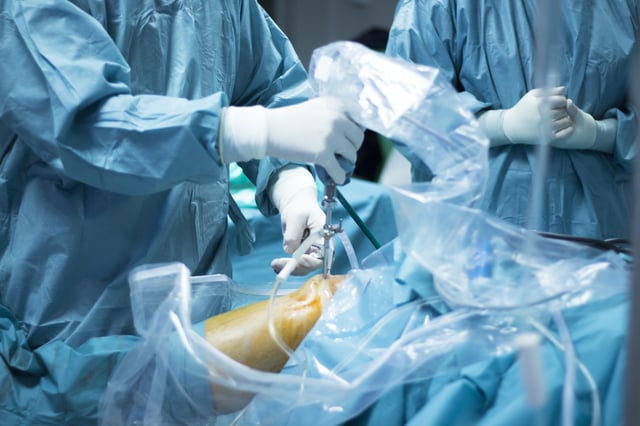I am often asked if anything can be done for knee problems that persist after a full or partial knee replacement.
A recent study looked at the percentage of patients with chronic knee pain after knee replacement at a minimum of one year following surgery in 272 patients. A questionnaire was sent to them at between 12 and 16 months following their surgery. Of the 272 patients who responded, 107 patients (nearly 40%) reported that they still had persistent pain at one-plus year following surgery. The median average pain rating (using the 0-10 numeric pain scale) was 3 out of 10, with pain reported as high as 5 out of 10. While you might think 5 out of 10, which is moderate pain, would be an improvement in knee pain after knee replacement, it isn’t that much different from the pain level most patients would describe prior to undergoing the knee replacement. This amount of pain can keep you from being able to do certain things like roller skate with the kids, or going on trips that require a lot of walking or climbing stairs, for example. Persistent pain is also commonly described as aching, tender, and tiring, which certainly would give someone pause when considering to participate is a variety of activies.
Furthermore, the persistent pain was most commonly described as aching, tender, and tiring.
ADDITIONAL STUDIES ON KNEE PAIN AFTER KNEE REPLACEMENT
While this most recent study we highlighted shows nearly 40% of patients still having chronic knee pain after knee replacement, there are other studies reporting higher percentages.
This French study looked at almost 2,000 knee replacement patients one year after their surgery. They used a nationalized health care system to track the new use of over-the-counter pain medicine, nerve-pain drugs, and narcotics. While we would expect to see very little new use of pain medications in this group of patients, a very surprising 47% of patients began taking new analgesic medications (like Tylenol and Motrin) during the year after their surgery! About 9% needed new nerve drugs and about 6% new narcotic drugs. Younger knee replacement patients and those with more pain before the surgery needed more drugs.
This study looked at more than 1,700 patients who had knee replacement. The focus was to determine how many would still have pain coming from the front of the knee joint. The researchers found that at five-plus years later, 20% had pain in the front of the knee. However, a stunning 54% of patients still had knee pain with only 46% being pain free. Also interesting was that 87% of patients had their knee pain develop after the surgery and within the first five years. In addition, knee pain in the front was more common among younger and more active patients.
This study reported 44% of patients with chronic knee pain after knee replacement and a remarkable 15% with “severe-extreme persistent pain.” Another study reported 53% with chronic pain after knee replacement.
Are People with Continuing Pain or depression after knee surgery Just being wimpy?
How is it possible that an arthritic knee isn’t the cause of knee pain? Many studies have shown that knee arthritis doesn’t necessarily cause pain. For example, many patients with arthritis on x-ray and MRI have no knee pain! I had a recent case of a "bone on bone" 83 year old knee pain patient who decreased her pain from a 9 to a 1 in just a few sessions of my breakthrough knee pain recovery program.
A recent study decided to use the ultimate test in patients with knee pain to see if they actually had painful knee joints. They injected numbing medicine inside the knee joint to see if the knee pain went away. The results? About one-third of patients didn’t get any relief! Since it’s common for a knee replacement decision to be made with just a cursory exam and an X ray, if one-third of the patients with the most common form of arthritis don’t have pain coming from the joint, how many patients are getting unnecessary knee replacements?
The upshot? While different studies may theorize a variety of reasons for chronic pain after knee replacement, the fact is, studies show that knee pain remains in a very high percentage of patients. With 40% or more of patients still experiencing pain a year following total knee replacement (and pain percentages increasing even more over time), it is clear that chronic knee replacement pain is very common.

Luckily for patients with continued knee pain after surgery an almost always overlooked phenomenon can eliminate or significantly help
Did you know that your brain and body parts can get out of clear communication with each other? It's true and the term used for the phenomenon is called dysafferentation. Simply put, when there is an alteration in nerves signals from joints, muscles and ligaments to the brain, the output from the brain is abnormal. The abnormal output from the brain can lead to pain, muscle weakness, and cramping or increased muscle tension in or around the joint sending the signals to the brain.
Dr. Allan Oolo Austin, the developer of Trigenics® developed a special sequence of Trigenics® procedures that updates the neurological input to the brain, which in turn, normalizes the brains output signalling, resulting in improved function. In essence, the brain forgets how to use the various lower extremity or knee muscles sending improper signals to the muscles which control knee movement. An imbalance in the way the knee muscles control movement of the knee develops. Some muscles become weak with others too tight. This imbalance results in improper movement, pain and weakness. As a result of the aberrant signals flowing to and from the brain, the painful movement and weakness remains until the communication is re-established. Until that time a downward deterioration spiral continues and the recovery is only partial, requiring the knee pain sufferer to cope with sub-optimal strength and function.
What is Trigenics ® ?
Trigenics® is a neurological muscle reprogramming system which resets the brain and the way it communicates with the body to instantly decrease pain and strengthen muscles and improve movement. This procedure involves applying 3 treatment techniques at the same time for a cumulative therapeutic effect, which is much greater than if you only receive one. Trigenics® combines resisted exercise neurology with muscle-sensor manipulation and biofeedback concentrative breathing to trick the brain into changing the way it signals the muscles and body.
In essence, Trigenics® procedures identify muscles that are too short and muscles that are weak. Unlike the traditional approach to strengthening weak muscles and stretching short muscle, concepts in the field of neurology are employed to stimulate various brain centers to instantly cause strength to return and muscles to relax and lengthen. Rather than these positive improvements being short-lived, they are analogous to receiving a software update and are permanent!
IN SUMMARY, PATIENTS WHO RECEIVE TRIGENICS® PROCEDURES FOR KNEE PAIN REPORT THE FOLLOWING:
- Pain relief
- Strength increase
- Range of motion increase
I know this explanation sounds somewhat far-fetched, but seeing and feeling the results first hand is all the proof that is needed. Of course my neurological training background and my education and training in the physiology of the body allows me to understand the neurology behind the "magic". In addition to this special procedure, other therapies and treatments are often used to heal and make corrections in various tissues.
Some of the other treatments I often emply to help decrease or eliminate knee pain and dysfunction that persists after full or partial knee replacement surgery are:
- Cutting Edge MLS Laser to help with restoring cartilage and speed of healing of ligaments, tendons and muscles.
- Triton DTS Spinal Decompression to decrease nerve interference at the level of the spinal nerves in the lower back that affect the lower extremties
- Brain-Based Therapy to rehabilitate the brain-body communication fully due to reduced brain stimulation from the reduced input as a result of the lack of movement characteristic of frozen shoulder impingement syndrome.
- Various soft tissue healing methods to help remodel scar tissue in tendons and ligaments
- Axial knee decompression with or without concurrent use of low level laser therapy
- Knee, hip, ankle and pelvic alignments
- Use of custom-fitted foot orthotics to improved alignment and joint function in the lower extremities.
- Nutritional support for cartilage and nerve repair, inflammation and pain reduction
- Re-establishing proper neurology that when "offline" results in increased knee pain
- Pulsed Electromagnetic Field Therapy (PEMF) helps with cellular repair of damage muscles, ligaments, bones and nerves.
Captitalizing on the training I received at the American Functional Neurology Institute, this new chronic knee pain care program is such a blessing to many. I know what it feels like to be restricted from one of my favorite activities (cycling) due to knee pain. Having to miss a few rides over the last couple of years spurred me on to help my patients with my innovative approach.
I am happy to report that now this amazing procedure to help with knee problems that persist after partial or complete knee replacement surgery is now available locally in Shelby Township, Michigan at Johnson Chiropractic Neurlogy & Nutrition by Dr. Karl R.O.S. Johnson, DC (Trigenics® Knee Doctor). Each case is evaluated individually and care plans are determined that will be in the patients best interest. Patients often report results like you see in the video below:
TO SCHEDULE YOUR INITIAL CASE REVIEW TO SEE IF JOHNSON CHIROPRACTIC NEUROLOGY & NUTRITION CAN HELP YOU OVERCOME YOUR KNEE PROBLEM, CALL (586) 731–8840 OR CLICK HERE TO REQUEST AN APPOINTMENT.
For more details about the natural approach I take with my patients, take a look at the book I wrote entitled: Reclaim Your Life; Your Guide To Revealing Your Body's Life-Changing Secrets For Renewed Health. It is available in my office or at Amazon and many other book outlets.
If you found value in this article, please use the social sharing icons at the top of this post and please share with those you know who are still suffering with knee pain or other chronic health challenges, despite receiving medical management. Help me reach more people so they may regain their zest for living! Thank you!






